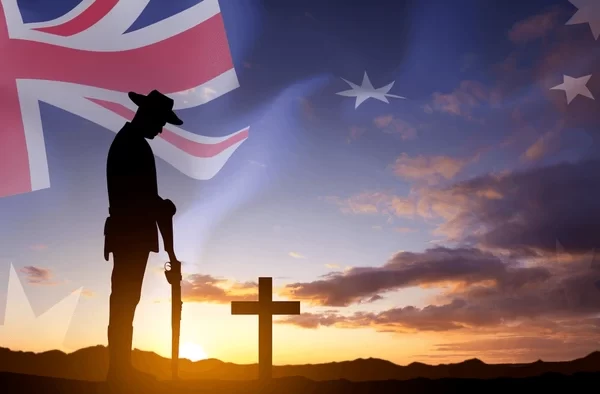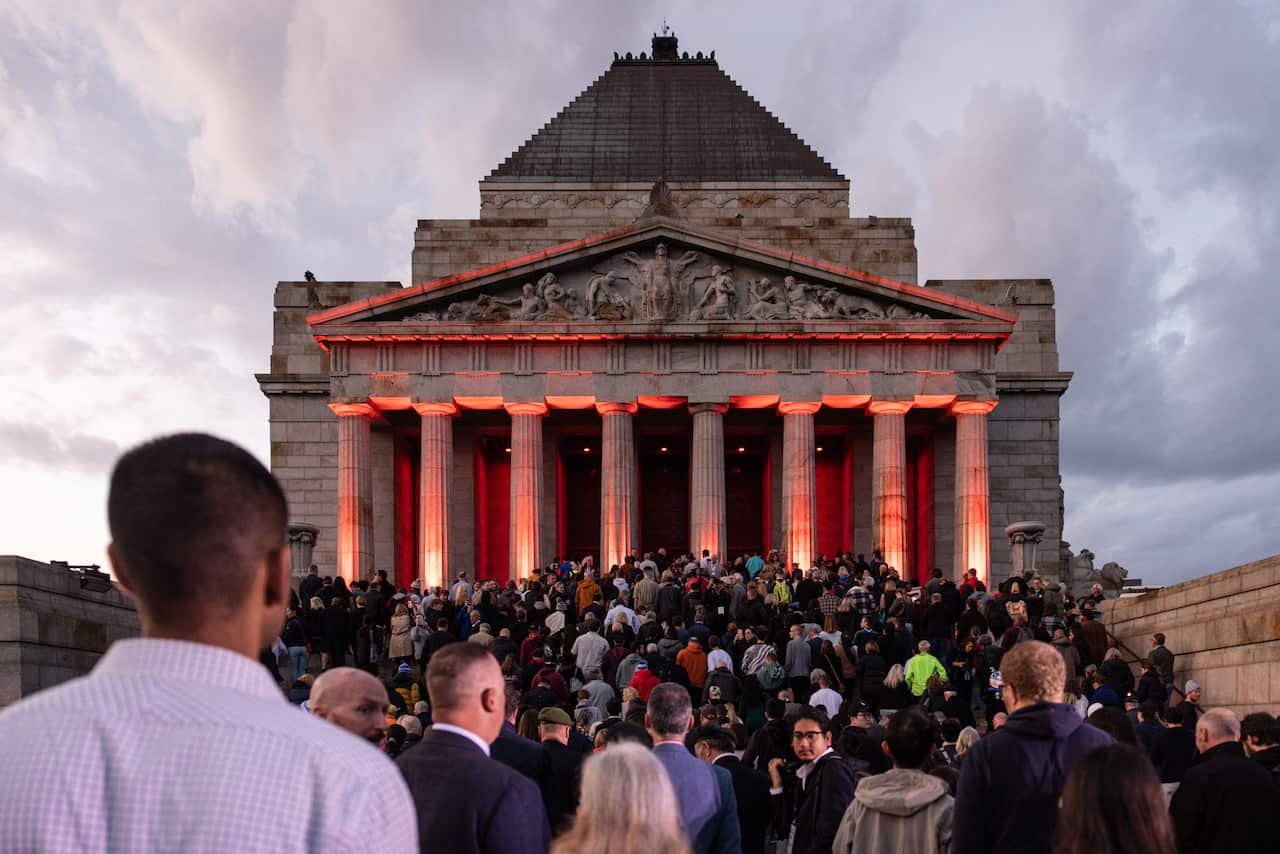Despite bouts of rain in some cities, large crowds turned out for traditional dawn services, wreath layings and parades.
Anzac Day, held annually on 25 April, recognises the more than 1.5 million Australians who have served in wars and peace operations, including 103,000 who lost their lives.
At the Cenotaph in Martin Place in Sydney, hundreds stood in the rain to pay their respects, surrounding the memorial’s solemn message: “To our glorious dead.”
Major General Matt Burr delivered a powerful commemoration address, encouraging new Australians and first-time dawn service attendees to seek out veterans and share in their stories.
People faced wet weather to attend the Anzac Day Dawn service at the Cenotaph in Martin Place in Sydney. Source: AAP / Bianca de Marchi
“Our women and men in uniform are just like you in many ways; from all backgrounds, from all across our communities,” Burr said.
“All Australians own and are part of the same legacy … the legacy of the first ANZACS who answered that call of duty, leaving behind the comforts of home and the warmth of loved ones to serve Australia.”
Continuing tradition, NSW Premier Chris Minns recited Australian writer and World War One veteran Sydney Elliott Napier’s poem Salute.
NSW Premier Chris Minns read the poem Salute by Sydney Napier at the Sydney dawn service. Source: AAP / Monique Harmer
Among the crowd was Gwen Cherne and her children Emily and Lachlan, who know first-hand what those who have fought for the nation have sacrificed.
Cherne lost her husband, Peter, to suicide in 2017 after a distinguished, nearly 20-year stint in the military.
Wreaths are laid at the Cenotaph during the Anzac Day dawn service in Martin Place, Sydney. Source: AAP / Bianca de Marchi
Now serving as Veteran Family Advocate Commissioner, she focuses on supporting the loved ones of those who have served.
“I know the sacrifice and how much (Anzac Day) means, not only to the serving men and women, but also to the families who pick up pieces, who bear the burdens, who hold the home front and make sure our society doesn’t crack.”
Rain didn’t deter those that showed up to the Cenotaph in Martin Place, Sydney for an Anzac Day dawn service. Source: AAP / Bianca de Marchi
Cherne said she found the large crowd in the Sydney city centre inspiring.
“I say this to families all the time, just bring your crying babies, bring your kids in pyjamas because veterans and families just want to know that you see them, that you support them,” she said.
Thousands of people later lined city centre streets for the annual march of Australian Defence Force (ADF) members and veterans, with more than 8,000 marching from Martin Place to the Anzac Memorial in Hyde Park.
Thousands of people lined the streets to pay tribute to veterans during the Anzac Day parade in Sydney. Source: AAP / Rick Rycroft
Honouring Indigenous Australians
Former Air Force warrant officer and Aboriginal Elder Harry Allie welcomed attendees to Gadigal country and touched on the history of Indigenous Australians within the defence force.
“As Indigenous Australians were not of European descent, they were exempt from military service during the time of World War One,” Allie said.
Aboriginal Elder Harry Allie touched on Indigenous Australians’ history within the defence force. Source: AAP / Dean Lewins
“[But] it has been estimated that up to 1,000, perhaps more, Aboriginal or Torres Strait Islander people came forward to enlist … it is not known what motivated Indigenous Australians to enlist but loyalty and patriotism without doubt played a part,” Allie said.
Federal leaders pause campaign to reflect
In Canberra, Prime Minister Anthony Albanese paused
campaigning to attend the dawn service at the Australian War Memorial.
The prime minister read a dedication at the Canberra service, saying the 25,000 who gathered before dawn ought to think of those who went to battle but did not come home.
Prime Minister Anthony Albanese gave the dedication at the Anzac Day dawn service at the Australian War Memorial in Canberra. Source: AAP / Lukas Coch
“As we gather around cenotaphs or watch the parades, we reflect on all who have served in our name and all who serve now,” Albanese said.
“Anzac Day asks us to stand against the erosion of time.”
The service was briefly interrupted by an attendee who yelled “free Palestine” before the national anthem was played, with one heckler telling the protester to “kick a landmine”.
For most of the service, it was only the sounds of bird calls emanating around the memorial that could be heard among the bugle calls and bagpipe laments.
Prime Minister Anthony Albanese paused his election campaign to attend the dawn service at the Australian War Memorial in Canberra. Source: AAP / Lukas Coch
Opposition leader Peter Dutton marked the day in his Queensland electorate of Dickson, attending a dawn service at the Pine Rivers RSL in the city’s north.
He laid a wreath and paid tribute to the one million Australians who have served. Dutton later attended a second service at Samford, also in his electorate.
Peter Dutton and his wife Kirilly attended an Anzac Day dawn service ceremony in Queensland. Source: AAP / Mick Tsikas
Welcome to Country interrupted at Melbourne service
Tens of thousands of Victorians attended the Shrine of Remembrance for one message: Lest we forget.
With the crescent moon still hanging overhead and the forecourt of the war memorial illuminated only by the deep red glow, attendees stood shoulder to shoulder in the chilly morning to mark Anzac Day.
Thousands of people attended an Anzac Day dawn service in Melbourne. Source: AAP / Diego Fedele
But the peace was broken during Bunurong Elder Mark Brown’s Welcome to Country,
.
The interruption was soon drowned out by louder applause from the crowd.
The incident was quickly condemned by RSL Victoria, which said the heckling was completely out of keeping with the intention of the solemn event.
Albanese said there was “no place in Australia” for what had occurred.
Bunurong Elder Uncle Mark delivers the Welcome to Country during the Anzac Day dawn service at the Shrine of Remembrance in Melbourne. Source: AAP / Diego Fedele
“A neo-Nazi disrupting Anzac Day is abhorrent, un-Australian, and disgraceful. The people responsible must face the full force of the law.”
Dutton also condemned those behind the disruption and said seeing instances of neo-Nazism in Australia was a “disgrace”.
“They have no place at all and they’re a stain on our national fabric, and they are not part of the Australian culture and nothing should overshadow what it is to be here to commemorate and to celebrate the contribution over successive generations of those that have served in uniform.
“Our greatest Australians are the Anzacs and I absolutely condemn any action from neo-Nazis or those people who would seek to disrupt Anzac Day services.”
This year marks the 110th anniversary of Australian and New Zealand soldiers landing before dawn on Turkish shores at Gallipoli on 25 April 1915, alongside British, French and Indian troops. Source: AAP / Diego Fedele
Veterans’ Affairs Minister Matt Keogh described the booing as “concerning” and urged attendees to uphold the spirit of respectful commemoration.
“These are days of commemoration, they’re days of peaceful respect,” he told Sky News.
“It’s expected that people who do attend Anzac Day ceremonies do so respectfully, and it’s concerning that some people didn’t show due respect to that service.”
Honouring diverse ANZAC contributions
24 Apr 2023, 8:43 pm
Honouring diverse ANZAC contributions
Victorian Premier Jacinta Allan “strongly condemned” the “hateful” incident.
“A neo-Nazi disrupting this day is appalling — it has no place here,” Allan said in a statement.
“To pierce the sombre silence of the dawn service is more than disrespect — it dishonours all who have served, fought and fallen.”
Victoria Police said they were aware of a “small group of people” who had disrupted the service. It said police had interviewed a 26-year-old man for offensive behaviour and would proceed with a summons.
A heckler also disrupted a Welcome to Country in Perth during commemorations, with WA premier Roger Cook calling the behaviour “disgusting” and “totally disrespectful”.
The ugly incidents were momentary blips in moving and vital events for many people.
For Sarah Byres and her son Matthew, the Melbourne dawn ceremony was their first at the shrine with her late father’s war medals proudly worn on their chests.
People pay their respects at the eternal flame during the dawn service at the Shrine of Remembrance in Melbourne. Source: AAP / Ye Myo Khant / SOPA Images / Sipa USA
Her father served in the Navy as a 17-year-old across multiple conflicts, including in Malta, Italy and the D-Day landings, facing bombings and surviving raining bullets.
“When the war ended and they celebrated, they handed everyone a tot of rum, but he was underage so he wasn’t allowed to have it,” Byres said.
“He was under 21, but he could go and fight.”
Dawn service attendees gathered at the Shrine of Remembrance in Melbourne. Source: AAP / Diego Fedele
Burial at sea marks solemn Gold Coast service
Thousands of Queenslanders turned out despite wet weather to line the streets of Brisbane and pay tribute to former and current armed forces personnel.
On the Gold Coast
, the ashes of veterans who’ve recently died were given a ceremonial burial at sea during one of Australia’s most poignant Anzac Day dawn services.
Illuminated in poppy red and with flags at half mast, Elephant Rock was the location for a solemn acknowledgement of the men and women who have served, and continue to serve, in conflict.
Several thousand people attended the service near the NSW border.
People gathered during an Anzac Day dawn service at Currumbin on the Gold Coast. Source: AAP / Jono Searle
Inflatable rescue boats were on hand during the burial at sea, a tribute during which the ashes of recently passed service men and women are laid to rest.
A roll call of veterans who have died echoed around the beach as the boats moved into strong waves off the shore.
Oars were raised as one into the air to pay respects to the fallen.
Children from the local surf lifesaving club stood with a choir as the Australian and New Zealand national anthems culminated the service.
Surf boats helped carry out a burial at sea during an Anzac Day dawn service at Currumbin on the Gold Coast. Source: AAP / Jono Searle
A legacy forged at Gallipoli
This year marks the 110th anniversary of Australian and New Zealand soldiers landing before dawn on Turkish shores on 25 April 1915, alongside British, French and Indian troops.
More than 8,000 Australian soldiers died during the unsuccessful campaign to control the Dardanelles Strait.
Greg Melick, national president of RSL Australia, said: “The Gallipoli campaign was the first major military action involving Australian and New Zealand forces.”
“They held their ground against almost impossible odds for eight months in the ravines and gullies of that rugged battleground, suffering terrible casualties.
“They fought with endurance, courage, ingenuity, good humour, and mateship.”
Readers seeking support can call Lifeline crisis support on 13 11 14 or text 0477 13 11 14 and Suicide Call Back Service on 1300 659 467.
ADF members and their families can call the Defence all-hours Support Line, a confidential telephone and online service, on 1800 628 036.
Open Arms provides 24-hour free and confidential counselling and support for current and former ADF members and their families on 1800 011 046.
Defence personnel, contemporary veterans, and their families can also contact national support services provider Soldier On during office hours 1300 620 380.




























